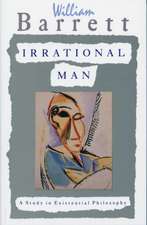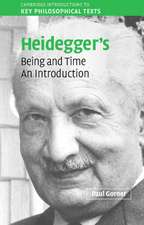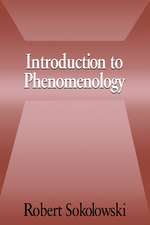Heidegger and the Politics of Disablement
Autor Thomas Abramsen Limba Engleză Hardback – 31 dec 2015
By reframing disability as a lived way of being in the world, rather than bodily malfunction, the book asks how we might rethink medicine and capitalism in democratic ways. It aims to transform Heidegger’s work in light of his troubling politics to produce a democratic social theory of human difference.
Preț: 383.33 lei
Nou
Puncte Express: 575
Preț estimativ în valută:
73.37€ • 75.61$ • 61.94£
73.37€ • 75.61$ • 61.94£
Carte tipărită la comandă
Livrare economică 01-15 martie
Preluare comenzi: 021 569.72.76
Specificații
ISBN-13: 9781137528551
ISBN-10: 1137528559
Pagini: 152
Ilustrații: VIII, 119 p.
Dimensiuni: 148 x 210 x 13 mm
Greutate: 0.3 kg
Ediția:1st ed. 2016
Editura: Palgrave Macmillan UK
Colecția Palgrave Pivot
Locul publicării:London, United Kingdom
ISBN-10: 1137528559
Pagini: 152
Ilustrații: VIII, 119 p.
Dimensiuni: 148 x 210 x 13 mm
Greutate: 0.3 kg
Ediția:1st ed. 2016
Editura: Palgrave Macmillan UK
Colecția Palgrave Pivot
Locul publicării:London, United Kingdom
Cuprins
Chapter 1. Introduction.- Chapter 2. Martin Heidegger.- Chapter 3. Medicalization.- Chapter 4. Capitalism.- Chapter 5. Gathering Ability.
Notă biografică
Thomas Abrams is a postdoctoral fellow in the Department of Social Justice Education, Ontario Institute for Studies in Education, University of Toronto, Canada. His research interests include Heidegger, Social Theory, Phenomenology, Embodiment, Economic Sociology and Critical Rehabilitation.
Textul de pe ultima copertă
This book presents the early existential phenomenology of Martin Heidegger as a way to reformulate academic disability studies and activist disability politics. It redresses the almost categorical neglect of human difference in the philosophy of Heidegger. It proceeds by applying a revised version of his phenomenology to social policy aimed to get disabled persons to work and to methods in rehabilitation science intended to be more ‘client friendly’. Phenomenological philosophy is extended to the topic of disability, while, at the same time, two key concerns facing disability studies are addressed: the roles of capitalism in disablement, and of medical practice in the lives of disabled persons.
By reframing disability as a lived way of being in the world, rather than bodily malfunction, the book asks how we might rethink medicine and capitalism in democratic ways. It aims to transform Heidegger’s work in light of his troubling politics to produce a democratic social theory of human difference.


















